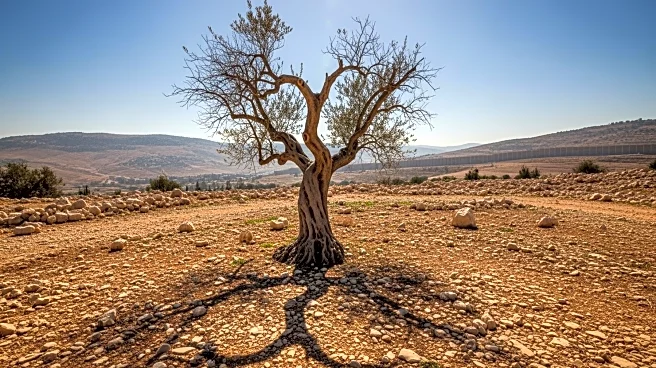What is the story about?
What's Happening?
The ongoing Israeli occupation in the West Bank has severely affected Palestinian agriculture, leading to a decline in food sovereignty. Since the beginning of the year, Israeli soldiers and settlers have displaced thousands of Palestinians from their land, exacerbating the situation. The occupation has resulted in the destruction of seed banks, uprooting of ancient olive trees, and cutting off water supplies, which are crucial for farming. In the village of Al-Maleh, the disappearance of a stream due to water pumping by settlers since 1967 has left the valley dry, forcing residents to rely on water deliveries for basic needs. The agricultural sector's contribution to the West Bank's GDP has been declining since the occupation began, impacting the livelihoods of many small family farms that make up over 70% of the farmland.
Why It's Important?
The decline in Palestinian agriculture due to the Israeli occupation has significant implications for the region's economy and food security. Agriculture is a vital part of Palestinian heritage and economy, with many families relying on it for sustenance and income. The disruption caused by the occupation threatens the traditional farming practices and the economic stability of these communities. The loss of agricultural productivity not only affects local food supply but also undermines the cultural and historical connection Palestinians have with their land. This situation highlights the broader geopolitical tensions in the region and the challenges faced by Palestinians in maintaining their livelihoods under occupation.
What's Next?
The continued occupation and its impact on agriculture may lead to increased international scrutiny and calls for intervention. Palestinian communities and advocacy groups are likely to seek support from international organizations to address the humanitarian and economic challenges posed by the occupation. Efforts to restore water access and protect agricultural lands could become focal points in negotiations and peace talks. The situation may also prompt further research and documentation of the occupation's effects on Palestinian agriculture, aiming to inform policy decisions and humanitarian aid strategies.
Beyond the Headlines
The occupation's impact on agriculture in the West Bank raises ethical and legal questions about land rights and resource access. The destruction of agricultural infrastructure and displacement of farmers highlight the human rights issues associated with the occupation. Long-term shifts in land use and agricultural practices may occur as Palestinians adapt to the changing environment, potentially leading to innovations in sustainable farming. The cultural significance of olive trees and terracing in Palestinian agriculture underscores the deep-rooted connection between the people and their land, which is threatened by ongoing geopolitical conflicts.

















